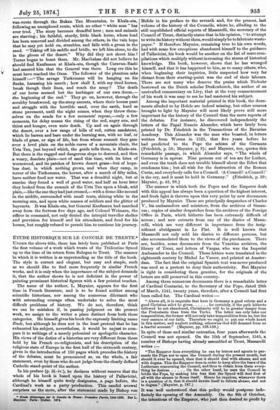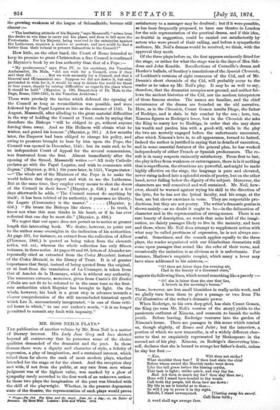ETUDE WISTORIQUE SUR LE CONCILE DE TRENTE.* UNDER the above
title, there has lately been published at Paris the first volume of a work which treats of the Tridentine Synod up to the time of its return from Bologna to Trent. The manner In which it is written is as unpretending as the title of the book. The style is correct and elegant, but easy and simple, such as we should like to find more frequently in similar French works, and it is only when the importance of the subject demands it, that the author shows he is not deficient in the power of painting prominent historical figures with a few pointed touches.
The name of the author, L. Maynier, appears for the first time in French literature, and is to be found neither among. scientific historians, nor among the numerous dilettanti who with astounding courage often undertake to solve the frost difficult problems of history. We do not, therefore, think we can be mistaken if, in passing judgment on the present work, we assign to the writer a place distinct from both these categories. He himself gives his book the expressly limiting name Etude, but although he does not in the least pretend that he has exhausted his subject, nevertheless, it would be unjust to com- pare it to writings of a merely polemical or apologetic character. His views of the duties of a historian are very different from those held by his French co-religionists, and his description of the religious state of Europe in the first half of the sixteenth century, given in the introduction of 150 pages which precedes the history of the debates, must be pronounced as, on the whole, a fair statement, even by those who do not judge from the clearly defined Catholic stand-point of the author.
In his preface (p. iii.-iv.), he declares without reserve that the whole of his book is based upon the history of Pallavicini, although he himself quite truly designates, a page before, the Cardinal's work as a party production. This candid avowal surprises us the more, after the statement made by Bishop von
Etude flistorigue sur le Candle de Trenle: Premi2re Partk, 1545-1562. Par L. Maynier. Paris : Didier. 1874.
Hefele in his preface to the seventh and, for the present, last volume of the history of the Councils, where he, alluding to the still unpublished official reports of Massarelli, the secretary of the Council of Trent, distinctly states that in his opinion, " to attempt to write its history without them, would simply be to fabricate waste- paper." If therefore Maynier, remaining true to his own words, had with some few exceptions abandoned himself to the guidance of Pallavicini, his book would be another on the list of mere com- pilations which multiply without increasing the stores of historical knowledge. His book, however, shows that he has wronged himself, and that it has happened to him, as to many others, who, when beginning their inquiries, little suspected how very far distant from their starting-point was the end of their labours. There are not many who deserve the praise which Niebuhr bestowed on the Dutch scholar Drakenborch, the author of an unrivalled commentary on Livy, that at the very commencement of his work it was easy to see he had mastered his subject.
Among the important material printed in this book, the docu- ments alluded to by Hefele are indeed missing, but other sources brought to light by Maynier will most likely prove still more important for the history of the Council than the mere reports of the debates. For instance, he -discovered independently the letters of the Papal Nuncio Aleander, which have lately been printed by Dr. Friedrich in the Transactions of the Bavarian Academy. This Aleander was the man who boasted, in letters written from Worms in 1521, that five years before he had predicted to the Pope the schism of the Germans (Friedrich, p. 53; Maynier, p. 8); and Maynier, too, quotes this remarkable passage, in which Aleander says, " The whole of Germany is in uproar. Nine persons out of ten are for Luther, and even the tenth does not trouble himself about the Edict that condemns him ; but all wish for the destruction of the Roman Curiae, and everybody calls for a Council. 'A Council! a Council!' is the cry, and it must be held in Germany." (Friedrich, p. 59 ; Maynier, p. 42, 98.) The manner in which both the Popes and the Emperor dealt with this appeal has always been a question of the highest interest, and fresh light is thrown upon this very point by new documents produced by Maynier. These are principally despatches of Charles V., his ambassadors and ministers, from the archives of Siman- cas ; copies of similar despatches from the archives of the Foreign Office in Paris, which hitherto has been extremely difficult of access ; and new extracts from one of the diaries of Massa- relli, which are very different in importance from the insig- nificant abridgment in Le Plat. It is well known that Massarelli not only sold his diaries to different persons, but also accommodated them to the views of the purchasers. There are, besides, some documents from the Venetian archives, the library of Trent, and letters of Vargas, who was the Imperial Ambassador to the Council. These letters were translated in the eighteenth century by Michel Le Vassor, and printed at Amster- dam. The fact that the original Spanish text was never produced was used as a pretext to deny their authenticity. But Maynier is right in considering them genuine, for the originals of the letters are still preserved in this country.
Among these numerous documents there is a remarkable letter of Cardinal Contarini, to the Secretary of the Pope, dated 29th of March, 1541, twenty years, therefore, after a Council had first been called for. The Cardinal writes :— "Above all, it is requisite that here in Germany a good reform and a good Christian edict be given for certainly, if the path hitherto followed be not abandoned, Christianity will be in greater danger from the Protestants than from the Turks. The latter can only take our temporalities, the former will not only take temporalities from us, but the very essence of our faith. Therefore we ought to put our whole heart in this matter, and neglect nothing, otherwise God will demand from us a fearful account." (Maynier, pp. 158-159.) In spite of these and similar entreaties, four years afterwards the Council was not opened. On the 15th of September, 1545, a number of Bishops having already assembled at Trent, Massarelli writes :— " The Emperor does everything he can by letters and agents to per- suade the Pope not to open the Council during the present month, but should it ever be opened, then that it should deal with abuses, and not with dogma. This the Emperor does in order to keep alive the fears of tho Lutherans concerning tho Council, and thus to obtain from them every-
thing he desires On the other hand, he uses the Council to bridle the Pope, by making him fear that the Synod will deal Gist of all with the abuses in Rome itself. Hence he requires, whenever there is a question of it, that it should devote itself to reform abuses, and not to dogma." (Maynier, p. 187.)
It was well understood that this policy would postpone inde- finitely the opening of the Assembly. On the 9th of October, the intentions of the Emperor, who just then desired to profit by
the growing weakness of the league of Schmalkalde, become still clearer :—
" The hesitating attitude of his Majesty," says Massarelli, "arises from the desire to win time to carry out his plans, and then to fall upon the Protestants. For his Majesty, being resolved to the enterprise against the Lutherans, requires a motive or pretext, and how could he find a better than their refusal to present themselves to the Council?"
How little, on the other hand, the Court of Rome intended to keep its promise to grant Christendom a free Council is confirmed in Maynier's book by no less authority than that of a Pope :—
" My predecessors," says Pius IV. to his confidant, the Venetian Ambassador, Da Mule, "did not wish for a Council, even if they
said they did But we wish earnestly for a Council, and that a General and (Ecumenical one. Suppose wo did not desire it, but only pretended to wish for it, it would be easy to delude the world for three or four years, simply by raising difficulties as regards the place where it should be held." (Maynier, p. 196, Despatches of Da Mula to the Doge, Rome, 1560-1561, in the Venetian Archives.)
These were precisely the tactics which deferred the opening of the Council as long as reconciliation was possible, and were followed by the Papal Legates so late as the summer of 1545. In August, Massarelli, after alluding to the great material difficulties in the way of holding the Council at Trent, ends by saying that therefore the Bishops " will be obliged to go, without anyone forcing them away. And so His Holiness will obtain what he wishes, and guard his honour." (Maynier, p. 191.) A few months later, the Emperor had been obliged to change his policy, and owing to pressure brought to bear by him upon the Pope, the Council was opened in December, 1545 ; but its main end, to be an independent Court of Appeal for the several communions, was frustrated from the first. Almost immediately after the opening of the Synod, Massarelli writes :—" All truly Catholic prelates go with the Papal Legates, and wish to commence with dogma." (Maynier, p. 204.) Six years later, in 1551, Vargas states : —" The whole art of the Ministers of the Pope is to make the world believe that they expect and wish to see the Lutherans. But at the same time, they employ every means to shut the doors of the Council in their faces." (Maynier, p. 656.) And a few days afterwards he adds, " The Council cannot do anything by itself ; it has been robbed of its authority, it possesses no liberty, the Legate (Crescenzio) is the master." (Maynier, p.
656.) " He treats the Bishops like slaves In truth, I know not what this man thinks in his heart, or if he has ever reflected that one day he must die." (Maynier, p. 658.)
We regret that our space does not permit us to notice at greater length this interesting book. We desire, however, to point out to the author some oversights in the indication of his authorities. At page 591, for instance, an extract from the collection of Alberi (Florence, 1846,) is quoted as being taken from the eleventh series, vol. cxi., whereas the whole collection has only fifteen volumes, in three series. At pages 88 and 89, letters of Aleander are repeatedly cited as extracted from the Codex Mazzoletti, instead of the Codex Mazzetti, in the library of Trent. It is of greater importance that Sarpi, instead of being quoted from the original, or at least from the translation of Le Courayer, is taken from that of Amelot de in Houssaye, which is without any authority. The numerous extracts, moreover, given from Canties Gli Eretici d'Italia are not fit to be referred to in the same tone as the first- rate authorities which Maynier has brought to light. On the whole, however, his book is a great step in advance towards a clearer comprehension of the still unconcluded historical epoch which Leo X. unconsciously inaugurated, "in one of those criti- cal hours in which," to use our author's words, " it is no longer permitted to commit any fault with impunity."



































 Previous page
Previous page